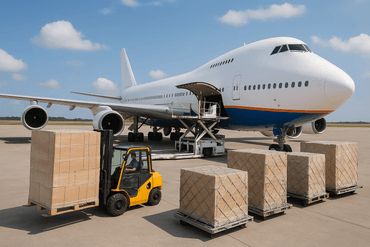
Golden Week in China: How logistics comes to a standstill



Golden Week is a national holiday in China that lasts for seven days. It is typically celebrated from October 1-7 and is a time for Chinese citizens to travel and visit family. This holiday can have a significant impact on logistics due to the increased demand for travel both within China and internationally.
What is the Chinese Golden Week?
As one of the world’s biggest and most important markets, China faces huge pressure on its logistical infrastructures to maintain a certain level of productivity and efficiency to keep the global supply chain oiled, running, and stable.
From factories and warehouses to ports, terminals, and more, Chinese workers across all logistical sectors clock long hours all year round to ensure the upkeep of the supply network worldwide.
But twice a year, the world’s largest exporter permits itself a break.
Known as the Golden Week in China, there are two such week-long respites in the country — one in each half of the year.
The first, known as the Chinese Lunar New Year Golden Week, is at the start of the year in January/February to give people time off to celebrate the Chinese New Year.
The second, the National Day Golden Week, is part of the country’s national day celebrations and happens in October — right in the middle of the shipping peak season.
Given China’s influence on the global market and world trade, a week-long —albeit anticipated— lull has the potential to cause chaos on supply chain operations and rippling effects and logistical delays around the world.
In this article, we’ll be focusing on the National Day Golden Week in October. But to understand how the National Day Golden Week in China affects logistics, we must first dive into some basic facts about the holiday.
When is the Golden Week in China?
The National Golden Week in China takes place in the first week of October every year to celebrate the founding of the People’s Republic of China.
The Chinese Golden Week runs every year from the 1 October (Tuesday) to the 7 October (Monday).
What happens during the Golden Week in China?
During the Golden Week in China, workers take a break from the hustles and bustles of life. Throngs of travelers crowd trains, buses, airports, to either get home to visit their families or travel.
And while China deals with the travel logistics of its Golden Week, the rest of the world grapples with the impact this has on their supply chain logistics.
Over the course of the Golden Week, factories across the country close and production comes to a standstill. Likewise, at ports and terminals, work and personnel are reduced to the bare minimum.
With operations running at a tiny fraction of full speed, productivity and efficiency levels shrink and it becomes logistically impossible for exporters and importers to get their goods moving into and out of China.
That means that all the action has to take place before the festivities begin.
How China Golden Week affects logistics
In the weeks leading up to the China Golden Week, demand for Chinese exports skyrockets as businesses attempt to get their exports out before operations in China completely shut down.
In response to the activity deficit, shipping carriers often announce service cuts.
At the time of writing, two of the main shipping alliances have announced cuts of 15 weekly sailings from Asia to North America:
- Nine to the West Coast
- Four to the East Coast
- Two to the Gulf Coast
Even post-Golden Week, capacity and personnel often remain limited and production can be slow to pick up. Carriers may also continue to cancel sailings in the weeks that follow.
That said, failure to get your merchandise into or out of China before the festivities may result in dire consequences, as delays from the Golden Week can sometimes last for months.
For businesses, this may translate to potential breaches in contracts, accruing delay fees, low sales figures, and so on.
The Golden Week Effect on Sea Freight, Air Freight, and Rail Freight
The effect of Golden Week on China’s transportation infrastructure is significant.
During Golden Week, China’s seaports and airports are often congested with travelers and freight. For example, the number of containers handled at the Port of Shanghai typically surges during Golden Week. This can lead to delays in loading and unloading ships and in the movement of containers to and from inland destinations.
The increased demand for transportation services during Golden Week can also lead to higher air and rail freight prices. This is due to the limited capacity of these transportation networks and the fact that many freight companies schedule their shipments around the holiday to avoid delays.
Golden Week can also have an impact on global supply chains. Many factories in China shut down for the holiday, which can lead to disruptions in the production of goods exported worldwide. This is particularly true for products that require parts or components from China. For example, the Golden Week shutdown of a factory that produces smartphone cases could lead to delays in shipments of those cases to other countries.
The Golden Week effect is not limited to China. It can also be seen in other countries with large numbers of Chinese tourists, such as Thailand and Japan. These countries often see an increase in tourism during Golden Week and a corresponding increase in the demand for goods and services. This can lead to higher prices for hotel rooms, restaurants, and other tourist attractions.
The Golden Week effect on rates and availability
It is no coincidence that the Golden Week in China takes place during the shipping peak season. In fact, it is considered to be the trigger to the first wave of soaring rates, high demand, low space and equipment availability, roll-overs, and congestions.
“Technically, China’s Golden Week is what kick-starts the shipping peak season. We see the first rate increases as early as July or August as shippers fight for space.
As operations slowly resume after the Golden Week, there’s a second wave of price increases as shipping preparations for Christmas and Chinese New Year get underway.”
— Aliona Yurlova, International Business Development Expert at iContainers
High demand, low space and equipment availability, roll-overs, and congestions are synonymous with both the China Golden Week and the shipping peak season.
But how are they a direct factor of the fluctuating and soaring shipping costs?
High demand and low availability
In the weeks prior to the start of the Golden Week, demand for exports out of China surge.
This is in anticipation of the shutdown as businesses importing from China try to secure a spot on outgoing vessels to ensure their goods are out of the country before production in the world’s largest exporter comes to a halt.
In response to this rising demand, shipping carriers increase spot rates. As of the beginning of September, spot rates from China to the North American West Coast is at its highest level in two months.
Amid this rush, the industry also faces scarcity of containers, slots, truckers, and everything in between. Shippers should be prepared to fork out more to secure not only a slot on a container vessel, but also for the equipment required for their shipments.
The standard General Rate Increases (GRIs) aside, there are also other surcharges to consider.
Given the higher demand for Chinese exports in comparison with Chinese imports, there’s often an urgent need containers to be returned to the terminal to manage the demand at Chinese ports.
This is when carriers begin implementing surcharges such as the Equipment Imbalance Surcharge (EIS) to compensate for the cost of ferrying empty containers back to Chinese ports to meet export demand.
Differing Golden Week strategies by carriers
The import-export imbalance caused by China’s National Day Golden Week also prompts vastly differing rate strategies by shipping carriers.
Despite the falling demand for Chinese imports, larger and more influential carriers, which have the benefit of a superior service (direct routes and shorter transit times) and reputation, tend to maintain their rates instead of lowering them to encourage sales.
In the event that there’s insufficient cargo to warrant a sailing, blank sailings and service cuts are normally announced. This is also to prevent FAK spot rates from falling below market level. As a result, ports often become more congested with rolled containers.
Smaller and Asian carriers, on the other hand, manage the softening import demand by lowering their rates. This is done even at a loss as they expect to be able to recover from the significantly higher rates for Chinese exports.
“Given this scenario, more cargo headed for China end up being booked with smaller carriers offering lower import rates. But given their limited capacity, this often results in the failure to match demand and cargo ends up getting rolled.
It’s this and the larger carriers’ blank sailings that contribute to the congestion we see before the Golden Week in China.”
— Aliona Yurlova
Is the Golden Week relevant only if you ship goods from or to China?
Golden Week is a national holiday in China, and many businesses close for the week. This can lead to disruptions in the supply chain, especially if your business relies on goods from or to China. If you’re shipping goods from or to China during Golden Week, it’s important to plan and allow extra time for delays.
Opportunity for some businesses
For there to be a loser, there must be a winner.
Despite the potential chaos the China Golden Week may cause to businesses, if managed properly, some companies can actually benefit from the operational shutdown in China.
Travel and consumption —both domestic and abroad— soar during the week-long holiday.
In 2021, nearly 700 million Chinese traveled domestically and abroad during the October Golden Week. Most visited neighboring Asian territories including Japan, Thailand, Hong Kong, and South Korea.
Domestically, the Golden Week consumption in 2020 reached $68.8 billion.
As an exporter, getting your merchandise into China and the popular holiday destinations of Chinese tourists in time for Golden Week could help to lift sales.
The boost to these neighboring territories doesn’t only come from the holidaying Chinese.
As Chinese production shuts down, overseas SMEs may begin looking at neighboring countries as an alternative source for their imports.
These are great opportunities for alternative markets and providers. Vietnam, for example, recently signed a free trade agreement with the EU. This may result in a European push towards Vietnamese imports instead of China.
Going by the same logic, SMEs may also turn to their local distributors, given that importing from China during the Golden Week isn’t an option.
How should you prepare for the Golden Week?
To ensure your shipments arrive on time during Golden Week, it’s important to plan and work with a reliable shipping partner. Here are a few tips on how to prepare for Golden Week:
Plan Ahead: Start planning for Golden Week early. Remember that many businesses will be closed, and transportation will be more limited, so factor in extra time for your shipments to arrive.
Work with a Reliable Shipping Partner: Choose a shipping partner who has experience shipping during Golden Week. They will be able to navigate the challenges and get your shipments delivered on time.
Be Flexible: Be prepared for delays and have a backup plan in place. Once your shipments are in transit, there may be unforeseen delays. A flexible delivery plan will help ensure that your shipments arrive on time despite delays.
Following these tips will help you avoid disruptions to your supply chain during Golden Week. Planning and working with a reliable shipping partner ensures that your shipments arrive on time and without any problems.
Advice on managing the Golden Week in China
Compare and choose wisely
Make sure you conduct thorough research on the capacity availability and routes offered by carriers as well as keep up to date with possible announcements of blank sailings, rate increases, and surcharges.
In general, carriers determine availability and rates based on:
- Rate agreement you or your freight forwarder have with the carrier: NAC (Named Account Customer) rates tend to be lower than FAK rates since these are specially negotiated rates for a particular client, usually with higher shipping volumes.
- Incoterm and port: Space availability vary according to the Incoterm and ports. For example, the number of slots assigned for cargo shipped under CPT may differ from the number of slots assigned to FCA cargo depending on the ports of origin and destination.
Book in advance to secure space
The magic number here is three weeks. That’s the minimum amount of time you need to have your cargo booked in advance to secure space.
Most freight forwarders have contracts with carriers that guarantees a certain amount of TEU slots per vessel sailing. During the peak season, container space that freight forwarders have first rights to that have not been filled two weeks prior to sailing are auctioned off to other clients.
Given the high demand and fight for space, our advice for shippers is to book as soon as possible or face paying a high cost to secure a spot.
Consider alternative container types
As the most-coveted container type, 20-ft containers are often the first boxes to be booked full.
During the period just before the Golden Week in China, demand often outweighs supply and it becomes extremely challenging to secure a 20-foot container.
As a workaround, consider other container types, including the 40-ft container.
“During periods of high demand, the 40-ft can be a good alternative to the 20-ft. Even though shippers may not need the extra space, the lower demand for the 40-ft can sometimes result in better rates and availability.”
— Aliona Yurlova
Other non-standard containers such as the open top containers, flat racks, and reefers may also be difficult to secure as availability is already scarce even during non-peak seasons.
If dealing with these non-standard containers, as the mantra goes, it’s recommended to book in advance to ensure availability.
Containers aside, also consider other equipment needed for the proper transportation of your container such as the trucking chassis, or other special equipment such as lift gates, ramps, etc.
Ensure open communication with your freight forwarder
As intermediaries, freight forwarders can facilitate the complexities of shipping during the Golden Week and help you manage these bottleneck challenges. They also have the expertise to foresee hiccups typically associated with the Golden Week.
As a shipper, be very clear about your needs and inform your freight forwarder as early as possible of any specific needs.
Here’s what a freight forwarder can help you with:
- Secure rates, space, and equipment for your ocean freight shipments
- Manage rates, space, and congestion at transit airports for air freight shipments
- Secure trucking and warehouse availability amid shortage and high demand
- Advise you on workarounds when faced with limited support from ports and customs
- 1. What is the Chinese Golden Week?When is the Golden Week in China?What happens during the Golden Week in China?
- 2. How China Golden Week affects logisticsThe Golden Week Effect on Sea Freight, Air Freight, and Rail FreightThe Golden Week effect on rates and availabilityHigh demand and low availabilityDiffering Golden Week strategies by carriers
- 3. Is the Golden Week relevant only if you ship goods from or to China?
- 4. Opportunity for some businesses
- 5. How should you prepare for the Golden Week?
- 6. Advice on managing the Golden Week in ChinaCompare and choose wiselyBook in advance to secure spaceConsider alternative container typesEnsure open communication with your freight forwarder
Related Articles


